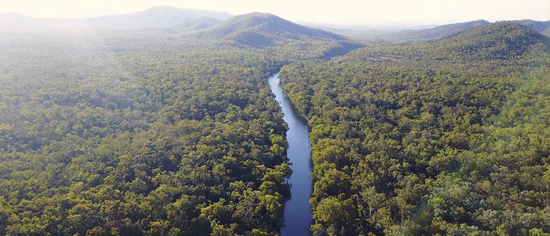Rainforest Trust
Oct 31, 2017
Press Release

For almost 30 years, Rainforest Trust has been the leader in the purchase and protection of private lands across the tropics for threatened species. The vast majority of these private lands are relatively small holdings, but the property known as Caloola Station, on the Cape York Peninsula of Australia, is over 44,000 acres. This property is almost entirely undisturbed and uniquely pristine habitat with a stronghold population of Endangered Northern Quolls, but until recently was on the verge of being sold to developers.
On October 31, Rainforest Trust supported its Australian partner South Endeavour Trust in the purchase of the 44,726-acre Caloola property, preventing the degradation and deforestation of this vital site. Located at the junction of the Wet Tropics, Cape York and Einasleigh Uplands bioregions, Caloola strategically connects these with two key wildlife corridors. It contains 28 regional ecosystems, 20 of which have little or no representation in the Australian protected area network. Furthermore, water for Cooktown is sourced from the Annan river that runs beside the Caloola property.
“This is a historic land purchase for Rainforest Trust and a monumentally important acquisition for wildlife conservation,†said CEO of Rainforest Trust Dr. Paul Salaman. “The Caloola property is strategically situated at the crossroads of Australia’s most biodiverse regions – the Daintree and Cape York tropical forests to the Great Barrier Reef – and now ensures a permanent connection for a vast network of protected areas that spans over 700,000 acres.â€

The presence of a very significant population of the Northern Quoll has been confirmed on the Caloola property. The Northern Quoll is listed as Endangered by IUCN and has been negatively impacted by habitat destruction and the non-native invasive Cane Toad, as the toads are poisonous to the quolls if consumed. The Northern Quoll population on Caloola seems to be one of the few populations that is not attempting to feed on the highly toxic Cane Toad. The protection of Caloola provides a place of refuge for this amazing marsupial.
With at least five different types of rainforest, the site also provides important habitat for the Buff-breasted Buttonquail, Black-footed Tree-rat, Red Goshawk, a range of tropical bats including the Ghost Bat and Semon’s Leaf-nosed bat, as well as the Bennett’s Tree-Kangaroo. It also has important populations of the threatened Cooktown Orchid and Cooktown Fan Palm.
Before being secured for conservation, the major threats to the Caloola property were derived from its proximity to the coast (just 4 miles away) and to Cooktown (about 5 miles), as it is in a prime location for residential or agriculture development. Any road construction or development could have caused major disturbances, as weed invasions – a major concern in Australia – are closely linked to vehicle movements. Such development would likely have also increased the amount of sediment coming off the property, further increasing the threat to the Great Barrier Reef.
“We are absolutely delighted to be partnering with Rainforest Trust on this incredibly important purchase, as without the organization’s support, Caloola and its values would have been lost for all time,â€
said Tim Hughes, Director of South Endeavour Trust. “Being so close to Cooktown and the coast, paired with some spectacular views of the Annan River Gorge and the Great Barrier Reef, it was inevitable that the property would have been developed if not protected now.â€
Rainforest Trust and South Endeavour Trust have also worked together to secure the Misty Mountain Wildlife Corridor, a 173.5-acre property which links a wildlife corridor to help complete a nearly 3 million-acre rainforest mosaic in the Wet Tropics World Heritage Area.
This project was generously supported through the SAVES Challenge, and through the leadership of our partners and Luanne Lemmer and Eric Veach.